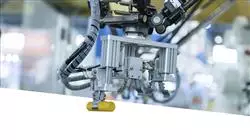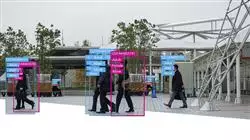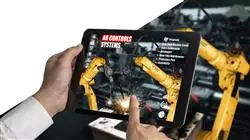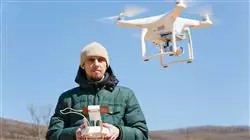University certificate
The world's largest faculty of engineering”
Introduction to the Program
Become a specialist in Industry 4.0, industrial process automation, robot planning algorithms and much more content created by Robotics experts”

It is undeniable that Robotics has driven the advancement of industry to levels that were unimaginable just a few years ago. It is already common to talk about Machine Learning or Artificial Intelligences, fields in which Robotics can expand to offer almost futuristic solutions to everyday or even medical problems, with robotic assistants in complex operations.
All this generates an undeniable growth opportunity for professional engineers who dedicate themselves to this field, as they will find a multitude of areas and projects to which they can direct their careers. From the purely industrial field to aerospace technologies and international programs, an appropriate specialization in Robotics can mean a quantitative and qualitative leap in quality for the engineers in their own professional career.
For this reason, TECH has assembled for this program a team of leaders in the field of Robotics, with extensive experience in numerous international projects of great prestige and an impeccable academic curriculum. Precisely this teaching profile means that the entire content of the program has a unique theoretical-practical approach, where the engineer will not only find the latest developments in Robotics, Artificial Intelligence and Communication Systems, but also the practical application of all this knowledge in real working environments.
Through numerous videos in detail, complementary readings, video summaries and self-knowledge exercises, the engineer will obtain a global and specialized vision of the current state of Robotics, being able to incorporate to his resume a program that positions him as a valuable asset for any company in the sector. All this, in addition, with the advantage of being able to manage the Master's Degree at your own pace, without having to attend classes or fixed schedules of any kind. The teaching is 100% online and allows the necessary flexibility to combine it with the most demanding personal and professional activity.
Join a program in which you will be the one who decides how, where and when to take on the entire course load, without having to sacrifice your personal or professional life to do so"
This Master's Degree in Robotics contains the most complete and up-to-date program on the market. The most important features include:
- Development of case studies presented by experts in robotic engineering
- The graphic, schematic, and practical contents with which they are created, provide scientific and practical information on the disciplines that are essential for professional practice
- Practical exercises where self-assessment can be used to improve learning
- Its special emphasis on innovative methodologies
- Theoretical lessons, questions to the expert, debate forums on controversial topics, and individual reflection assignments
- Content that is accessible from any fixed or portable device with an Internet connection
Enroll now and don't miss the opportunity to delve into the application of Robotics to virtual and augmented reality technologies, with virtual sensors and mixed mobile applications"
The program’s teaching staff includes professionals from the sector who contribute their work experience to this training program, as well as renowned specialists from leading societies and prestigious universities.
Its multimedia content, developed with the latest educational technology, will provide the professional with situated and contextual learning, i.e., a simulated environment that will provide an immersive education programmed to learn in real situations.
The design of this program focuses on Problem-Based Learning, by means of which the professionals must try to solve the different professional practice situations that are presented throughout the program. For this purpose, the student will be assisted by an innovative interactive video system created by renowned experts.
Get the boost your career needs by incorporating this Master's Degree in your value proposal"

Master the most advanced and modern Robotics with topics dedicated exclusively to visual SLAM, computer vision and Visual Servoing"
Syllabus
The teaching team involved in the design of the entire syllabus has used the Relearning methodology, favoring a progressive and natural teaching for the whole program. This is achieved through a reiteration of the most important key concepts in Robotics and advanced engineering, so that the student does not have to spend long hours of study to acquire this knowledge.

You have within your reach the key to direct your engineering career towards the field of Robotics. Don't waste this oportunity and enroll now"
Module 1. Robotics: Robot Design and Modeling
1.1. Robotics and Industry 4.0
1.1.1. Robotics and Industry 4.0
1.1.2. Application Fields and Use Cases
1.1.3. Sub-Areas of Specialization in Robotics
1.2. Robot Hardware and Software Architectures
1.2.1. Hardware Architectures and Real-Time
1.2.2. Robot Software Architectures
1.2.3. Communication Models and Middleware Technologies
1.2.4. Robot Operating System (ROS) Software Integration
1.3. Mathematical Modeling of Robots
1.3.1. Mathematical Representation of Rigid Solids
1.3.2. Rotations and Translations
1.3.3. Hierarchical State Representation
1.3.4. Distributed Representation of the State in ROS (TF Library)
1.4. Robot Kinematics and Dynamics
1.4.1. Kinematics
1.4.2. Dynamics
1.4.3. Underactuated Robots
1.4.4. Redundant Robots
1.5. Robot Modeling and Simulation
1.5.1. Robot Modeling Technologies
1.5.2. Robot Modeling with URDF
1.5.3. Robot Simulation
1.5.4. Modeling with Gazebo Simulator
1.6. Robot Manipulators
1.6.1. Types of Manipulator Robots
1.6.2. Kinematics
1.6.3. Dynamics
1.6.4. Simulation
1.7. Terrestrial Mobile Robots
1.7.1. Types of Terrestrial Mobile Robots
1.7.2. Kinematics
1.7.3. Dynamics
1.7.4. Simulation
1.8. Aerial Mobile Robots
1.8.1. Types of Aerial Mobile Robots
1.8.2. Kinematics
1.8.3. Dynamics
1.8.4. Simulation
1.9. Aquatic Mobile Robots
1.9.1. Types of Aquatic Mobile Robots
1.9.2. Kinematics
1.9.3. Dynamics
1.9.4. Simulation
1.10. Bioinspired Robots
1.10.1. Humanoids
1.10.2. Robots with Four or More Legs
1.10.3. Modular Robots
1.10.4. Robots with Flexible Parts (Soft-Robotics)
Module 2. Intelligent Agents. Application of Artificial Intelligence to Robots and Softbots
2.1. Intelligent Agents and Artificial Intelligence
2.1.1. Intelligent Robots. Artificial Intelligence
2.1.2. Intelligent Agents
2.1.2.1. Hardware Agents Robots
2.1.2.2. Software Agents. Softbots
2.1.3. Robotics Applications
2.2. Brain-Algorithm Connection
2.2.1. Biological Inspiration of Artificial Intelligence
2.2.2. Reasoning Implemented in Algorithms. Typology
2.2.3. Explainability of Results in Artificial Intelligence Algorithms
2.2.4. Evolution of Algorithms up to Deep Learning
2.3. Search Algorithms in the Solution Space
2.3.1. Elements in Solution Space Searches
2.3.2. Solution Search Algorithms in Artificial Intelligence Problems
2.3.3. Applications of Search and Optimization Algorithms
2.3.4. Search Algorithms Applied to Machine Learning
2.4. Machine Learning
2.4.1. Machine Learning
2.4.2. Supervised Learning Algorithms
2.4.3. Unsupervised Learning Algorithms
2.4.4. Reinforcement Learning Algorithms
2.5. Supervised Learning
2.5.1. Supervised Learning Methods
2.5.2. Decision Trees for Classification
2.5.3. Support Vector Machines
2.5.4. Artificial Neural Networks
2.5.5. Applications of Supervised Learning
2.6. Unsupervised Learning
2.6.1. Unsupervised Learning
2.6.2. Kohonen Networks
2.6.3. Self-Organizing Maps
2.6.4. K-Means Algorithm
2.7. Reinforcement Learning
2.7.1. Reinforcement Learning
2.7.2. Agents Based on Markov Processes
2.7.3. Reinforcement Learning Algorithms
2.7.4. Reinforcement Learning Applied to Robotics
2.8. Artificial Neural Networks and Deep Learning
2.8.1. Artificial Neural Networks. Typology
2.8.2. Applications of Neural Networks
2.8.3. Transformation from Machine Learning to Deep Learning
2.8.4. Deep Learning Applications
2.9. Probabilistic Inference
2.9.1. Probabilistic Inference
2.9.2. Types of Inference and Method Definition
2.9.3. Bayesian Inference as a Case Study
2.9.4. Nonparametric Inference Techniques
2.9.5. Gaussian Filters
2.10. From Theory to Practice: Developing an Intelligent Robotic Agent
2.10.1. Inclusion of Supervised Learning Modules in a Robotic Agent
2.10.2. Inclusion of Reinforcement Learning Modules in a Robotic Agent
2.10.3. Architecture of a Robotic Agent Controlled by Artificial Intelligence
2.10.4. Professional Tools for the Implementation of the Intelligent Agent
2.10.5. Phases of the Implementation of AI Algorithms in Robotic Agents
Module 3. Robotics in the Automation of Industrial Processes
3.1. Design of Automated Systems
3.1.1. Hardware Architectures
3.1.2. Programmable Logic Controllers
3.1.3. Industrial Communication Networks
3.2. Advanced Electrical Design I: Automation
3.2.1. Design of Electrical Panels and Symbology
3.2.2. Power and Control Circuits. Harmonics
3.2.3. Protection and Grounding Elements
3.3. Advanced Electrical Design II: Determinism and Safety
3.3.1. Machine Safety and Redundancy
3.3.2. Safety Relays and Triggers
3.3.3. Safety PLCs
3.3.4. Safe Networks
3.4. Electrical Actuation
3.4.1. Motors and Servomotors
3.4.2. Frequency Inverters and Controllers
3.4.3. Electrically Actuated Industrial Robotics
3.5. Hydraulic and Pneumatic Actuation
3.5.1. Hydraulic Design and Symbology
3.5.2. Pneumatic Design and Symbology
3.5.3. ATEX Environments in Automation
3.6. Transducers in Robotics and Automation
3.6.1. Position and Velocity Measurement
3.6.2. Force and Temperature Measurement
3.6.3. Presence Measurement
3.6.4. Vision Sensors
3.7. Programming and Configuration of Programmable Logic Controllers PLCs
3.7.1. PLC Programming: LD
3.7.2. PLC Programming: ST
3.7.3. PLC Programming: FBD and CFC
3.7.4. PLC Programming: SFC
3.8. Programming and Configuration of Equipment in Industrial Plants
3.8.1. Programming of Drives and Controllers
3.8.2. HMI Programming
3.8.3. Programming of Manipulator Robots
3.9. Programming and Configuration of Industrial Computer Equipment
3.9.1. Programming of Vision Systems
3.9.2. SCADA/Software Programming
3.9.3. Network Configuration
3.10. Automation Implementation
3.10.1. State Machine Design
3.10.2. Implementation of State Machines in PLCs
3.10.3. Implementation of Analog PID Control Systems in PLCs
3.10.4. Automation Maintenance and Code Hygiene
3.10.5. Automation and Plant Simulation
Module 4. Automatic Control Systems in Robotics
4.1. Analysis and Design of Nonlinear Systems
4.1.1. Analysis and Modeling of Nonlinear Systems
4.1.2. Feedback Control
4.1.3. Linearization by Feedback
4.2. Design of Control Techniques for Advanced Non-linear Systems
4.2.1. Sliding Mode control
4.2.2. Lyapunov and Backstepping Control
4.2.3. Control Based on Passivity
4.3. Control Architectures
4.3.1. The Robotics Paradigm
4.3.2. Control Architectures
4.3.3. Applications and Examples of Control Architectures
4.4. Motion Control for Robotic Arms
4.4.1. Kinematic and Dynamic Modeling
4.4.2. Control in Joint Space
4.4.3. Control in Operational Space
4.5. Actuator Force Control
4.5.1. Force Control
4.5.2. Impedance Control
4.5.3. Hybrid Control
4.6. Terrestrial Mobile Robots
4.6.1. Equations of Motion
4.6.2. Control Techniques for Terrestrial Robots
4.6.3. Mobile Manipulators
4.7. Aerial Mobile Robots
4.7.1. Equations of Motion
4.7.2. Control Techniques in Aerial Robots
4.7.3. Aerial Manipulation
4.8. Control Based on Machine Learning Techniques
4.8.2. Control Using Supervised Learning
4.8.3. Control Using Reinforced Learning
4.8.4. Control by Unsupervised Learning
4.9. Vision-Based Control
4.9.1. Position-Based Visual Servoing
4.9.2. Image-Based Visual Servoing
4.9.3. Hybrid Visual Servoing
4.10. Predictive Control
4.10.1. Models and State Estimation
4.10.2. MPC Applied to Mobile Robots
4.10.3. MPC Applied to UAVs
Module 5. Robot Planning Algorithms
5.1. Classical Planning Algorithms
5.1.1. Discrete Planning: State Space
5.1.2. Planning Problems in Robotics. Robotic Systems Models
5.1.3. Classification of Planners
5.2. The Trajectory Planning Problem in Mobile Robots
5.2.1. Forms of Environment Representation: Graphs
5.2.2. Search Algorithms in Graphs
5.2.3. Introduction of Costs in Networks
5.2.4. Search Algorithms in Heavy Networks
5.2.5. Algorithms with any Angle Approach
5.3. Planning in High Dimensional Robotic Systems
5.3.1. High Dimensionality Robotics Problems: Manipulators
5.3.2. Direct/Inverse Kinematic Model
5.3.3. Sampling Planning Algorithms PRM and RRT
5.3.4. Planning Under Dynamic Constraints
5.4. Optimal Sampling Planning
5.4.1. Problem of Sampling-Based Planners
5.4.2. RRT Probabilistic Optimality Concept
5.4.3. Reconnection Step: Dynamic Constraints
5.4.4. CForest. Parallelizing Planning
5.5. Real Implementation of a Motion Planning System
5.5.1. Global Planning Problem. Dynamic Environments
5.5.2. Cycle of Action, Sensorization. Acquisition of Information from the Environment
5.5.3. Local and Global Planning
5.6. Coordination in Multi-Robot Systems I: Centralized System
5.6.1. Multirobot Coordination Problem
5.6.2. Collision Detection and Resolution: Trajectory Modification with Genetic Algorithms
5.6.3. Other Bio-Inspired Algorithms: Particle Swarm and Fireworks
5.6.4. Collision Avoidance by Choice of Maneuver Algorithm
5.7. Coordination in Multi-Robot Systems II: Distributed Approaches I
5.7.1. Use of Complex Objective Functions
5.7.2. Pareto Front
5.7.3. Multi-Objective Evolutionary Algorithms
5.8. Coordination in Multi-Robot Systems III: Distributed Approaches II
5.8.1. Order 1 Planning Systems
5.8.2. ORCA Algorithm
5.8.3. Addition of Kinematic and Dynamic Constraints in ORCA
5.9. Decision Planning Theory
5.9.1. Decision Theory
5.9.2. Sequential Decision Systems
5.9.3. Sensors and Information Spaces
5.9.4. Planning for Uncertainty in Sensing and Actuation
5.10. Reinforcement Learning Planning Systems
5.10.1. Obtaining the Expected Reward of a System
5.10.2. Mean Reward Learning Techniques
5.10.3. Inverse Reinforcement Learning
Module 6. Artificial Vision Techniques in Robotics: Image Processing and Analysis
6.1. Computer Vision
6.1.1. Computer Vision
6.1.2. Elements of a Computer Vision System
6.1.3. Mathematical Tools
6.2. Optical Sensors for Robotics
6.2.1. Passive Optical Sensors
6.2.2. Active Optical Sensors
6.2.3. Non-Optical Sensors
6.3. Image Acquisition
6.3.1. Image Representation
6.3.2. Color Space
6.3.3. Digitizing Process
6.4. Image Geometry
6.4.1. Lens Models
6.4.2. Camera Models
6.4.3. Camera Calibration
6.5. Mathematical Tools
6.5.1. Histogram of an Image
6.5.2. Convolution
6.5.3. Fourier Transform
6.6. Image Preprocessing
6.6.1. Noise Analysis
6.6.2. Image Smoothing
6.6.3. Image Enhancement
6.7. Image Segmentation
6.7.1. Contour-Based Techniques
6.7.2. Histogram-Based Techniques
6.7.3. Morphological Operations
6.8. Image Feature Detection
6.8.1. Point of Interest Detection
6.8.2. Feature Descriptors
6.8.3. Feature Matching
6.9. 3D Vision Systems
6.9.1. 3D Perception
6.9.2. Feature Matching between Images
6.9.3. Multiple View Geometry
6.10. Computer Vision based Localization
6.10.1. The Robot Localization Problem
6.10.2. Visual Odometry
6.10.3. Sensory Fusion
Module 7. Robot Visual Perception Systems with Automatic Learning
7.1. Unsupervised Learning Methods applied to Computer Vision
7.1.1. Clustering
7.1.2. PCA
7.1.3. Nearest Neighbors
7.1.4. Similarity and Matrix Decomposition
7.2. Supervised Learning Methods Applied to Artificial Vision
7.2.1. “Bag of words” Concept
7.2.2. Support Vector Machine
7.2.3. Latent Dirichlet Allocation
7.2.4. Neural Networks
7.3. Deep Neural Networks: Structures, Backbones and Transfer Learning
7.3.1. Feature Generating Layers
7.3.3.1. VGG
7.3.3.2. Densenet
7.3.3.3. ResNet
7.3.3.4. Inception
7.3.3.5. GoogLeNet
7.3.2. Transfer Learning
7.3.3. The Data Preparation for Training
7.4. Artificial Vision with Deep Learning I: Detection and Segmentation
7.4.1. YOLO and SSD Differences and Similarities
7.4.2. Unet
7.4.3. Other Structures
7.5. Computer Vision with Deep Learning II: Generative Adversarial Networks
7.5.1. Image Super-Resolution Using GAN
7.5.2. Creation of Realistic Images
7.5.3. Scene Understanding
7.6. Learning Techniques for Localization and Mapping in Mobile Robotics
7.6.1. Loop Closure Detection and Relocation
7.6.2. Magic Leap. Super Point and Super Glue
7.6.3. Depth from Monocular
7.7. Bayesian Inference and 3D Modeling
7.7.1. Bayesian Models and "Classical" Learning
7.7.2. Implicit Surfaces with Gaussian Processes (GPIS)
7.7.3. 3D Segmentation Using GPIS
7.7.4. Neural Networks for 3D Surface Modeling
7.8. End-to-End Applications of Deep Neural Networks
7.8.1. End-to-End System. Example of Person Identification
7.8.2. Object Manipulation with Visual Sensors
7.8.3. Motion Generation and Planning with Visual Sensors
7.9. Cloud Technologies to Accelerate the Development of Deep Learning Algorithms
7.9.1. Use of GPUs for Deep Learning
7.9.2. Agile Development with Google Colab
7.9.3. Remote GPUs, Google Cloud and AWS
7.10. Deployment of Neural Networks in Real Applications
7.10.1. Embedded Systems
7.10.2. Deployment of Neural Networks. Use
7.10.3. Network Optimizations in Deployment, Example with TensorRT
Module 8. Visual SLAM. Robot Localization and Simultaneous Mapping by Artificial Vision Techniques
8.1. Simultaneous Localization and Mapping (SLAM)
8.1.1. Simultaneous Localization and Mapping. SLAM
8.1.2. SLAM Applications
8.1.3. SLAM Operation
8.2. Projective Geometry
8.2.1. Pin-Hole Model
8.2.2. Estimation of Intrinsic Parameters of a Chamber
8.2.3. Homography, Basic Principles and Estimation
8.2.4. Fundamental Matrix, Principles and Estimation
8.3. Gaussian Filters
8.3.1. Kalman Filter
8.3.2. Information Filter
8.3.3. Adjustment and Parameterization of Gaussian Filters
8.4. Stereo EKF-SLAM
8.4.1. Stereo Camera Geometry
8.4.2. Feature Extraction and Search
8.4.3. Kalman Filter for Stereo SLAM
8.4.4. Stereo EKF-SLAM Parameter Setting
8.5. Monocular EKF-SLAM
8.5.1. EKF-SLAM Landmark Parameterization
8.5.2. Kalman Filter for Monocular SLAM
8.5.3. Monocular EKF-SLAM Parameter Tuning
8.6. Loop Closure Detection
8.6.1. Brute Force Algorithm
8.6.2. FABMAP
8.6.3. Abstraction Using GIST and HOG
8.6.4. Deep Learning Detection
8.7. Graph-SLAM
8.7.1. Graph-SLAM
8.7.2. RGBD-SLAM
8.7.3. ORB-SLAM
8.8. Direct Visual SLAM
8.8.1. Analysis of the Direct Visual SLAM Algorithm
8.8.2. LSD-SLAM
8.8.3. SVO
8.9. Visual Inertial SLAM
8.9.1. Integration of Inertial Measurements
8.9.2. Low Coupling: SOFT-SLAM
8.9.3. High Coupling: Vins-Mono
8.10. Other SLAM Technologies
8.10.1. Applications Beyond Visual SLAM
8.10.2. Lidar-SLAM
8.10.2. Range-only SLAM
Module 9. Application of Virtual and Augmented Reality Technologies to Robotics
9.1. Immersive Technologies in Robotics
9.1.1. Virtual Reality in Robotics
9.1.2. Augmented Reality in Robotics
9.1.3. Mixed Reality in Robotics
9.1.4. Difference between Realities
9.2. Construction of Virtual Environments
9.2.1. Materials and Textures
9.2.2. Lighting
9.2.3. Virtual Sound and Smell
9.3. Robot Modeling in Virtual Environments
9.3.1. Geometric Modeling
9.3.2. Physical Modeling
9.3.3. Model Standardization
9.4. Modeling of Robot Dynamics and Kinematics Virtual Physical Engines
9.4.1. Physical Motors. Typology
9.4.2. Configuration of a Physical Engine
9.4.3. Physical Motors in the Industry
9.5. Platforms, Peripherals and Tools Most Commonly Used in Virtual Reality
9.5.1. Virtual Reality Viewers
9.5.2. Interaction Peripherals
9.5.3. Virtual Sensors
9.6. Augmented Reality Systems
9.6.1. Insertion of Virtual Elements into Reality
9.6.2. Types of Visual Markers
9.6.3. Augmented Reality Technologies
9.7. Metaverse: Virtual Environments of Intelligent Agents and People
9.7.1. Avatar Creation
9.7.2. Intelligent Agents in Virtual Environments
9.7.3. Construction of Multi-User Environments for VR/AR
9.8. Creation of Virtual Reality Projects for Robotics
9.8.1. Phases of Development of a Virtual Reality Project
9.8.2. Deployment of Virtual Reality Systems
9.8.3. Virtual Reality Resources
9.9. Creating Augmented Reality Projects for Robotics
9.9.1. Phases of Development of an Augmented Reality Project
9.9.2. Deployment of Augmented Reality Projects
9.9.3. Augmented Reality Resources
9.10. Robot Teleoperation with Mobile Devices
9.10.1. Mixed Reality on Mobile Devices
9.10.2. Immersive Systems using Mobile Device Sensors
9.10.3. Examples of Mobile Projects
Module 10. Robot Communication and Interaction Systems
10.1. Speech Recognition: Stochastic Systems
10.1.1. Acoustic Speech Modeling
10.1.2. Hidden Markov Models
10.1.3. Linguistic Speech Modeling: N-Grams, BNF Grammars
10.2. Speech Recognition Deep Learning
10.2.1. Deep Neural Networks
10.2.2. Recurrent Neural Networks
10.2.3. LSTM Cells
10.3. Speech Recognition: Prosody and Environmental Effects
10.3.1. Ambient Noise
10.3.2. Multi-Speaker Recognition
10.3.3. Speech Pathologies
10.4. Natural Language Understanding: Heuristic and Probabilistic Systems
10.4.1. Syntactic-Semantic Analysis: Linguistic Rules
10.4.2. Comprehension Based on Heuristic Rules
10.4.3. Probabilistic Systems: Logistic Regression and SVM
10.4.4. Understanding Based on Neural Networks
10.5. Dialog Management: Heuristic/Probabilistic Strategies
10.5.1. Interlocutor's Intention
10.5.2. Template-Based Dialog
10.5.3. Stochastic Dialog Management: Bayesian Networks
10.6. Dialog Management: Advanced Strategies
10.6.1. Reinforcement-Based Learning Systems
10.6.2. Neural Network-Based Systems
10.6.3. From Speech to Intention in a Single Network
10.7. Response Generation and Speech Synthesis
10.7.1. Response Generation: From Idea to Coherent Text
10.7.2. Speech Synthesis by Concatenation
10.7.3. Stochastic Speech Synthesis
10.8. Dialog Adaptation and Contextualization
10.8.1. Dialog Initiative
10.8.2. Adaptation to the Speaker
10.8.3. Adaptation to the Context of the Dialogue
10.9. Robots and Social Interactions: Emotion Recognition, Synthesis and Expression
10.9.1. Artificial Voice Paradigms: Robotic Voice and Natural Voice
10.9.2. Emotion Recognition and Sentiment Analysis
10.9.3. Emotional Voice Synthesis
10.10. Robots and Social Interactions: Advanced Multimodal Interfaces
10.10.1. Combination of Vocal and Tactile Interfaces
10.10.2. Sign Language Recognition and Translation
10.10.3. Visual Avatars: Voice to Sign Language Translation

Download all the content and get an essential reference guide for any professional engineer dedicated to Robotics"
Master's Degree in Robotics
Robotics has experienced an unprecedented expansion in recent years, driven by the automation and robotization of more and more industrial and commercial sectors. From the famous Boston Dynamics videos to the most advanced drones, robots have become an integral part of everyday life. But, to become an expert in Robotics, it is imperative that you have a high level of background in this area, especially in projects as complex as space exploration or the development of autonomous vehicles. However, don't worry, because TECH has designed this Master's Degree in Robotics to position you as a well-versed expert in this field.
You will generate up-to-date knowledge on Artificial Intelligence
TECH's Master's Degree in Robotics brings together world-class experts, including PhDs in Engineering and professionals specialized in Robotics with experience in academia and aerospace. This program offers a unique opportunity to boost your professional career through quality online education, without the need to attend classes or meet established schedules. Thus, you will have access to the most up-to-date vision of Robotics, with the objective of developing the mathematical foundations for kinematic and dynamic modeling of robots or to generate specialized knowledge about Artificial Intelligence. All this and more in a 1,500-hour course that will allow you to stand out in your field and face the most important challenges of the future in Robotics Engineering. To that end, your academic performance will be boosted by dynamic study materials, such as interactive summaries, self-assessment exercises or in-depth videos.







